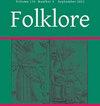爱沙尼亚和斯洛文尼亚关于酒精和饮酒的谚语的社会文化观点
IF 0.2
4区 社会学
0 FOLKLORE
引用次数: 0
摘要
本文探讨了爱沙尼亚和斯洛文尼亚与饮酒有关的谚语,目的是在更广泛的社会文化背景下解释这些谚语,并分析谚语中关于这一主题的争议。考虑到各地的酒精消费形式不同,本文考察了作为南欧地理区域和斯拉夫语族代表的斯洛文尼亚材料,以及作为北欧地理区域和芬兰-乌戈尔语族代表的爱沙尼亚材料。研究所涵盖的单位包括以下词语:葡萄酒,啤酒,烈酒(伏特加),醉酒和饮酒。我们分析谚语作为文化隐喻单位,通常被认为是国家认同的基石和民族道德的指南针,是如何适应这种民族借口的。我们关注三个不同的方面:被视为特定于民族文化的方面;性别和家庭(性别不平等,喝酒是男子气概的象征);还有关于喝酒的矛盾心理。本文章由计算机程序翻译,如有差异,请以英文原文为准。
A Sociocultural View of Estonian and Slovenian Proverbs on Alcohol and Drinking
Abstract This article explores Estonian and Slovenian proverbs related to alcohol and drinking with the aim of interpreting these proverbs in their broader sociocultural context and analysing the controversies embedded in proverbs on this topic. Considering that alcohol is not consumed in the same form everywhere, the article examines Slovenian material as representative of the geographical region of Southern Europe and the Slavic language group, and Estonian material as representative of the geographical region of Northern Europe and the Finno-Ugric language group. The units encompassed by the research contain the following words: wine, beer, spirits (vodka), drunk, and drinking. We analyse how proverbs—as culturally metaphorical units often considered the cornerstone of national identity and a compass of ethnic morals—fit into this ethnic pretext. We focus on three different aspects: those regarded as specific to national culture; gender and family (gender inequality, drinking alcohol as a symbol of masculinity); and the ambivalence surrounding drinking.
求助全文
通过发布文献求助,成功后即可免费获取论文全文。
去求助
来源期刊

FOLKLORE
FOLKLORE-
CiteScore
0.60
自引率
25.00%
发文量
0
期刊介绍:
A fully peer-reviewed international journal of folklore and folkloristics. Folklore is one of the earliest journals in the field of folkloristics, first published as The Folk-Lore Record in 1878. Folklore publishes ethnographical and analytical essays on vernacular culture worldwide, specializing in traditional narrative, language, music, song, dance, drama, foodways, medicine, arts and crafts, popular religion, and belief. It reviews current studies in a wide range of adjacent disciplines including anthropology, cultural studies, ethnology, history, literature, and religion. Folklore prides itself on its special mix of reviews, analysis, ethnography, and debate; its combination of European and North American approaches to the study of folklore; and its coverage not only of the materials and processes of folklore, but also of the history, methods, and theory of folkloristics. Folklore aims to be lively, informative and accessible, while maintaining high standards of scholarship.
 求助内容:
求助内容: 应助结果提醒方式:
应助结果提醒方式:


